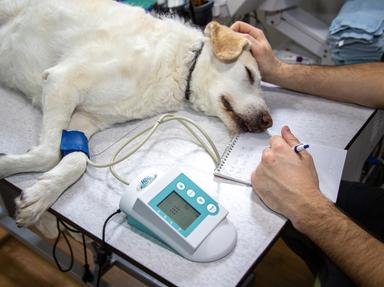Quiz Answer Key and Fun Facts
1. What is the proper name of heartworms?
2. Heartworms can be prevented.
3. Which type of animals do heartworms NOT infect?
4. How do pets get heartworms?
5. What is the test for heartworms?
6. What is usually the first sign of heartworms in dogs?
7. After receiving the drug Immiticide (melarsomine) to kill adult heartworms, what is a critical thing to have the treated dog do for the next few weeks?
8. If a dog is given a blood transfusion from a dog that has heartworms, the dog that gets the blood will also contract heartworms.
9. Is there an effective treatment for cats who get infected with heartworms?
10. Is it possible for a pet to still get heartworms while on a monthly preventative medication?
Source: Author
BigTriviaDawg
This quiz was reviewed by FunTrivia editor
rossian before going online.
Any errors found in FunTrivia content are routinely corrected through our feedback system.
